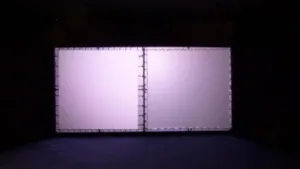We had a chance to see RealD’s ‘Ultimate’ screen in action at CineEurope. We first heard about this development at Cinemacon 2015 (Screen Technology Gets More Attention), and got more information at this year’s Display Summit China (RGB vs. LP Debate for Cinemas Rages at Display Summit China).
The Ultimate screen was designed to be an alternative to traditional silver screens, which are required for 3D projection. Unlike silver screens, which are painted (and thus have a non-uniform surface – a close-up showed multiple dark spots), the Ultimate screen has a much more uniform layer. It is not entirely flat; RealD found that adding some artificially raised spots (on a microscopic scale) increased reflectance. RealD claimed that as much as 92% of light is reflected, compared to 50% on a silver screen.
As a side effect of not using silver paint, colours look less metallic. Hot spots were also greatly reduced (although still visible).
Another feature making the Ultimate screen more efficient is its much smaller perforations. Every cinema screen is covered in tiny holes, to help transmit sound from the speakers behind them. A normal screen has machined holes that are around 1.5mm wide. In contrast, the Ultimate screen’s perforations are lasered, and are 0.15mm wide. This also, apparently, lowers 3D cross-talk to around 10% of that seen on a silver screen.
Because more light is reflected, colours are brighter and 3D looks deeper. A clip from Jurassic World demonstrated this to great effect, with the dinosaurs in the foreground being much more ‘in your face’ than on the silver screen.
The conversation that dominated CineEurope was laser projection and speckle. Vibrating a screen using actuators is one way to get around speckle, although one that cinema owners and projector makers both hate. However, RealD is sticking with it and hopes to make the entire process less painful. The Ultimate screen is installed in a much tauter frame than a traditional silver screen, which has some slack. This means that fewer actuators are required.
RealD is now working to lower the cost of the Ultimate screen. Only about six have been installed worldwide today, including one in London.

